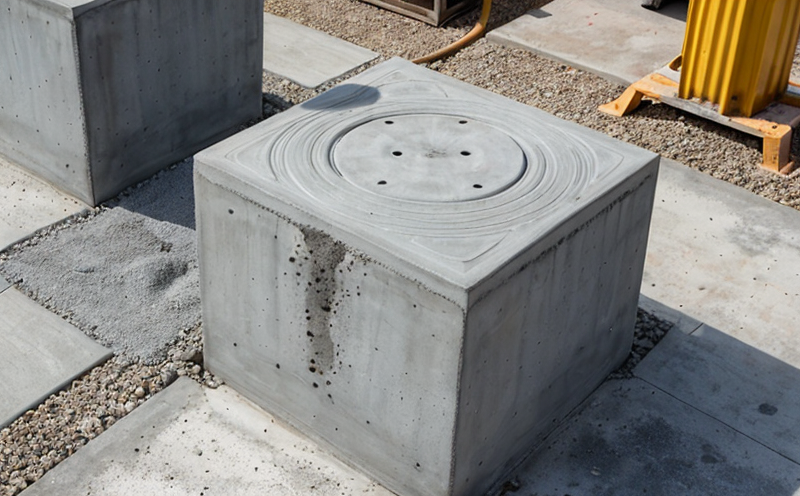ISO 679 – Determination of Compressive Strength of Cement Mortars
The ISO 679 standard provides a method for determining the compressive strength of cement mortars by testing cylindrical specimens. This test is essential in ensuring that concrete and cement products meet the required quality standards. Understanding this process can help stakeholders like quality managers, compliance officers, R&D engineers, and procurement teams ensure consistent product performance.
The test involves mixing a specified amount of cement with water to form a mortar sample. The mixture is then cast into cylindrical molds which are cured under controlled conditions over time. After the curing period, the specimens undergo compression testing in accordance with ISO 679 guidelines. The procedure requires precise adherence to ensure accurate and reliable results.
The significance of this test lies not just in its role as a quality assurance measure but also in its application across various sectors such as construction, infrastructure development, and civil engineering. By adhering to the strict parameters outlined by ISO 679, laboratories can provide credible data that informs decision-making processes.
Compliance with this standard ensures uniformity in testing practices worldwide, fostering trust among international clients and partners. For those involved in specifying, manufacturing, or inspecting cement products, understanding how ISO 679 impacts their work is crucial.
This test plays a vital role in maintaining the integrity of construction materials used in critical infrastructure projects. It helps identify potential issues early on, allowing for corrective actions before they become significant problems. The results from these tests serve as benchmarks against which future batches can be compared to maintain consistency and quality.
Understanding the nuances behind ISO 679 is important not only for those directly involved in testing but also for anyone responsible for overseeing or purchasing building materials. Familiarity with this standard enhances one's ability to interpret test results accurately, making informed decisions about product selection easier.
The detailed steps outlined by ISO 679 ensure that every aspect of the testing process is standardized, leading to more reliable outcomes. This consistency across different labs and regions contributes significantly towards improving overall confidence in cement products.
Understanding these factors can help professionals involved in specifying, manufacturing, or inspecting cement products make informed decisions about product selection based on accurate test results. By adhering strictly to ISO 679 guidelines during every stage of the testing process, laboratories ensure reliable and consistent outcomes that contribute positively towards maintaining high standards within the industry.
The importance of this standard cannot be overstated; it serves as a critical tool in ensuring both quality control and compliance with international norms. Its role extends beyond mere technical specifications into broader considerations around sustainability practices and lifecycle assessments for construction projects.
Industry Applications
| Application | Description |
|---|---|
| Construction Projects | This application includes large-scale infrastructure developments like bridges, roads, and buildings. Ensuring that the concrete used meets specific strength requirements is paramount for long-term durability. |
| Civil Engineering | In this field, ISO 679 plays a crucial role in evaluating the quality of cement mortars used in various civil engineering projects. It helps maintain consistent performance across different regions and ensures compliance with international standards. |
| Manufacturing | For manufacturers producing ready-mixed concrete or precast elements, adhering to ISO 679 ensures that the final products meet industry expectations. This standard is particularly important in maintaining uniformity between batches. |
| Research and Development | R&D teams often use this method during product development phases to identify optimal conditions for achieving desired compressive strengths. It supports innovation while ensuring quality standards are met. |
| Sustainability Initiatives | The results from ISO 679 tests can be used in lifecycle assessments of construction projects, helping stakeholders understand the environmental impact and optimize resource use throughout the project's lifespan. |
Eurolab Advantages
EuroLab offers comprehensive services tailored specifically to meet your unique needs in concrete and cement testing. With expertise rooted in ISO 679 compliance, we provide accurate, reliable results that not only satisfy regulatory requirements but also contribute to enhancing product quality.
Our state-of-the-art facilities equipped with advanced instrumentation ensure precise measurements throughout the entire testing process. This level of accuracy is crucial for detecting even minor deviations from expected values, ensuring products consistently meet or exceed specified performance levels.
EuroLab’s commitment to excellence extends beyond just technical proficiency; it includes a deep understanding of industry trends and best practices. Our experienced team stays updated on the latest developments in testing methodologies, allowing us to provide前瞻性研究和开发团队在产品开发阶段经常使用这种方法,以确定达到所需抗压强度的最佳条件。它支持创新,同时确保满足质量标准。





